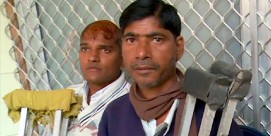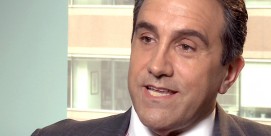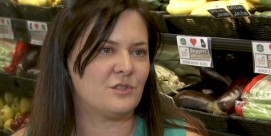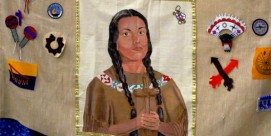Misericordia
BOB ABERNETHY, anchor: Caring for the disabled has long been a priority for people of faith, but sometimes that care means sheltering those persons from the outside world. Some advocates argue that many of the disabled would be better off if they were more integrated into society — in group houses, for example. In Chicago, the Sisters of Mercy disagree with this. They say that by reaching out to the community, they’ve been able to provide the supervision — and the programs — that allow their residents to lead happy and challenging lives, right where they are. Judy Valente reports.
JUDY VALENTE: This group of teenagers is being entertained by some of the residents of a large home for the mentally and physically challenged. The performers have Down’s syndrome. They function at a third-grade level.
Unidentified GIRL: It was touching. I wanted to cry, knowing they’re mentally challenged.
VALENTE: The place is called Misericordia — Latin for “heart of mercy.” Most of the residents can’t perform like this. Some of them can barely move.
Unidentified THERAPIST: Turn the can crusher on for me, David.
VALENTE: Misericordia tries to provide dignity, even for the most severely disabled. In this recycling program, David Nelson touches a large button, activating a machine that crushes a can and drops it into a bin. This is David’s job.
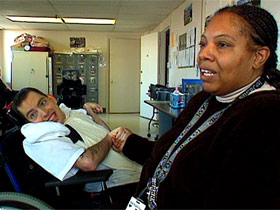 Unidentified THERAPIST: He gets to use his hands and his eyesight, and the sound. It’s a benefit to him because he gets enjoyment out of working. And it’s like when we go out to work and we enjoy our job. He enjoys his job.
Unidentified THERAPIST: He gets to use his hands and his eyesight, and the sound. It’s a benefit to him because he gets enjoyment out of working. And it’s like when we go out to work and we enjoy our job. He enjoys his job.
VALENTE: While states have largely taken over the funding of programs for people with special needs, it still falls to religious organizations to care for many of society’s most vulnerable people.
Sr. MARY CATHERINE MCDONAGH (Sisters of Mercy, Misericordia): We’re helping people pay attention to a group that deserves not to live in a back room somewhere, but to have a quality of life.
VALENTE: The Sisters of Mercy run Misericordia, which accepts both Catholics and non-Catholics. For the lay staff and volunteers, there is one important requirement.
Sr. ROSEMARY CONNELLY (General Manager, Misericordia): We want them to be people of compassion. We don’t want them to be feeling sorry for our children and adults. We want them to believe in our children and adults, that they not only have a right to life, but one worth living.
VALENTE: That means having programs for them, because Misericordia has more than 500 residents functioning at many different levels. This was once an orphanage. When it closed in 1976, the Chicago archdiocese turned it over to the Sisters of Mercy to care for people with disabilities. Sister Rosemary wanted to make sure it would not become a warehouse for the unwanted.
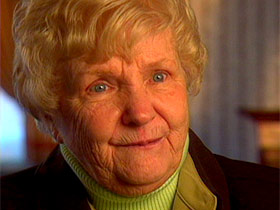 Sr. CONNELLY: I was determined that they were going to get out of bed. So I called hospitals and I called universities and I asked for help. I told them that we have all these little children and we have no program. So the universities and the hospital said, “You create the programs and we’ll come to you.”
Sr. CONNELLY: I was determined that they were going to get out of bed. So I called hospitals and I called universities and I asked for help. I told them that we have all these little children and we have no program. So the universities and the hospital said, “You create the programs and we’ll come to you.”
VALENTE: The residents aren’t all children. Some have spent most of their lives here.
Sr. CONNELLY: They would never again spend their whole days in bed. You’ll see every program imaginable. And you’ll see it done creatively, lovingly, and generously.
VALENTE: Misericordia gets $30 million a year from the state of Illinois. But it raises another $10 million from the Chicago community. That support — financial and political — has made the difference.
Sr. CONNELLY: Too many places are too ready to say, “The state doesn’t pay for it so we don’t do it.” Maybe that’s one difference between Misericordia and other places. We say, “The state doesn’t do it, but we’ll do it, and we’ll do it by reaching out to people and asking for their help.” And I’ve never been refused.
VALENTE: With the help of corporate sponsors, the annual one-day outdoor festival, held on the Misericordia grounds, raised $800,000 last year. There are also candy days, golf outings, and other events. The money helps to support Misericordia’s bakery and its restaurant. Both operate at a deficit, but they give the higher-functioning residents a place to work.
Sr. CONNELLY: They are loved, they are cared for, they are challenged as much as they can be challenged.
Sr. MCDONAGH: Meg is actually laying on her stomach right now on this equipment to help her get a chance to practice raising her head and stretching her arms. It gives her a chance at exercise. She’s lifting her head because she’s interested in what’s going on, and she loves seeing people.
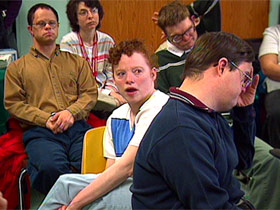 Sr. CONNELLY: Working at Misericordia is extremely difficult. It is work that demands complete unselfishness.
Sr. CONNELLY: Working at Misericordia is extremely difficult. It is work that demands complete unselfishness.
VALENTE: Misericordia faces challenges of its own. For one thing, the religious sisters who have made it a success are aging, and there are few sisters to replace them. And the trend in caring for people with special needs has been away from large institutions, to independent living in neighborhoods.
Sr. CONNELLY: We can provide opportunities that no isolated house could ever provide. They have art, they have music, they have swimming, they have a health club. They have all kinds of activities. And that really enhances their lives.
VALENTE: This is Terry Morrissey. He was born without fingers or toes, and with an elongated head. His job, every day, is to cut newspaper into thin strips. Others will process the paper, and make it into papier-maché masks. Terry says he was “born lucky.”
TERRY MORRISSEY: One of the most wonderful gifts God has ever given me is the gift of my friendships.
VALENTE: An outgoing man, who has been here since he was a child, Terry is known as the mayor of Misericordia.
Mr. MORRISSEY: They call me the mayor of Misericordia because I’m one of those hot guys that gets in on parties. I really enjoy life here.
Sr. CONNELLY: One time a doctor came in. We walked around and he said, “You spend a lot of money on these programs?” I said, “Yes, we do.” He said, “Do you think these kids are going to go out and be productive?” I said, “Doctor, if they die tomorrow, but today was worth living, I think it justifies what we’re doing here today.”
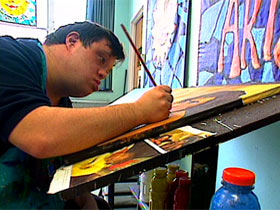 VALENTE: This is Peter Marcucci. He performs only simple tasks, like blending the paper that will be used to make the masks. But he is also a painter. This is his work. At a recent charity auction the artwork produced by the residents here raised $50,000.
VALENTE: This is Peter Marcucci. He performs only simple tasks, like blending the paper that will be used to make the masks. But he is also a painter. This is his work. At a recent charity auction the artwork produced by the residents here raised $50,000.
Mass is said every day, and is well attended. This is the Saturday mass, which family members also attend.
Sr. CONNELLY: I do believe the children and adults generally have a very, very rich faith life. I don’t think many of them ask, “Why am I a person with mental disabilities?” They know, somehow, this life is but a brief moment in time, and the best is yet to come. They know that for many happenings in life there are no answers. But there are answering people. People who care about them, who love them, who respond to them.
VALENTE: Hundreds of families are waiting to get their children into Misericordia, because so few of the residents ever want to leave.
Sr. CONNELLY: Our whole philosophy is, we don’t take this child from you, we share this child with you.
VALENTE: The families are expected to volunteer; there are 7,000 people in the database. They are asked to pay only what they can, but also to assist in fund-raising. For them, Misericordia provides comfort. Julie Harrington’s family brought her here in 1988. She is now 44 years old.
(to Julie Harrington): How do you like living here?
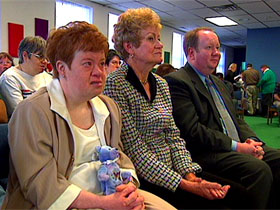 JULIE HARRINGTON: I love it!
JULIE HARRINGTON: I love it!
MARIAN HARRINGTON: It just means peace of mind. The greatest gift any family could have is to know your child’s been taken care of so wonderfully.
VALENTE: Among the more severely disabled, early death is not uncommon.
Sr. MCDONAGH: We’ve never had an easy time letting go of any child.
Sr. CONNELLY: How many of us will touch people the way they touched? Because there is such a beauty about them. They’re so accepting and loving and tolerant of us. It’s a beautiful gift they give to people.
VALENTE: But what is the future for Misericordia? The Sisters of Mercy number only a quarter of what they were 40 years ago.
Sr. CONNELLY: The reality is that we are not the future. And it’s a hard reality because religious sisters have made a wonderful contribution, not only to the Church but to human services. We have had the freedom to be available, completely, because we don’t have the pressure of a family.
VALENTE: When the sisters are gone, it will be up to the lay people they have trained to carry on their commitment to caring for people with special needs — people like Terry Morrissey.
Mr. MORRISSEY: I love being the mayor of Misericordia. I think it’s one of the most challenging, one of the most responsible jobs I’ve ever had in such a long time.
VALENTE: For Religion & Ethics NewsWeekly, I’m Judy Valente in Chicago.
ABERNETHY: For its 550 residents, Misericordia has 1,000 full- and part-time employees and 7,000 volunteers in its database.


